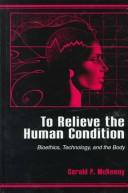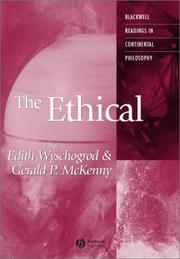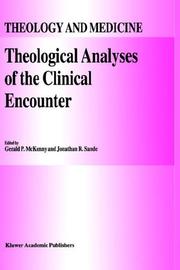| Listing 1 - 9 of 9 |
Sort by
|

ISBN: 0791434737 0791434745 9780791434741 9780791434734 Year: 1997 Publisher: Albany (N.Y.): State university of New York press,
Abstract | Keywords | Export | Availability | Bookmark
 Loading...
Loading...Choose an application
- Reference Manager
- EndNote
- RefWorks (Direct export to RefWorks)
Medical ethics --- Bioethics --- technowetenschappen --- ethiek van de technologie (technologiekritiek, technologiemisbruik) --- biomedische technologie --- lichaam --- mensbeeld --- verbetergeneeskunde (mensverbetering) --- godsdienst (religie, religieuze aspecten) --- moraaltheologie --- theologische ethiek --- biopolitiek --- christendom --- Biology --- Biomedical ethics --- Life sciences --- Life sciences ethics --- Science --- Clinical ethics --- Ethics, Medical --- Health care ethics --- Medical care --- Medicine --- Professional ethics --- Nursing ethics --- Social medicine --- technosciences --- éthique de la technologie (critique de la technologie, abus de la technologie) --- technologie biomédicale --- corps --- image de l'homme --- médecine de l'amélioration (médecine d'amélioration) --- religion (aspects religieux) --- théologie morale --- éthique théologique --- biopolitique --- christianisme --- Moral and ethical aspects
Book
ISBN: 9781108422802 1108422802 9781108435154 1108435157 9781108385916 1108395244 1108385915 110839728X 9781108397285 Year: 2018 Publisher: New York : Cambridge University Press,
Abstract | Keywords | Export | Availability | Bookmark
 Loading...
Loading...Choose an application
- Reference Manager
- EndNote
- RefWorks (Direct export to RefWorks)
In public debates over biotechnology, theologians, philosophers, and political theorists have proposed that biotechnology could have significant implications for human nature. They argue that ethical evaluations of biotechnologies that might affect human nature must take these implications into account. In this book, Gerald McKenny examines these important yet controversial arguments, which have in turn been criticized by many moral philosophers and professional bioethicists. He argues that Christian ethics is, in principle, committed to some version of the claim that human nature has normative status in relation to biotechnology. Showing how both criticisms and defences of this claim have often been facile, he identifies, develops, and critically evaluates three versions of the claim, and contributes a fourth, distinctively Christian version to the debate. Focusing on Christian ethics in conversation with secular ethics, McKenny's book is the first thorough analysis of a controversial contemporary issue.
Biotechnology --- Ethics --- 241.63*5 --- Deontology --- Ethics, Primitive --- Ethology --- Moral philosophy --- Morality --- Morals --- Philosophy, Moral --- Science, Moral --- Philosophy --- Values --- 241.63*5 Theologische ethiek: bio-ethiek (bioethiek); genetische experimenten; transplantatie; eugenetica --- Theologische ethiek: bio-ethiek (bioethiek); genetische experimenten; transplantatie; eugenetica --- Social aspects --- Ethics. --- Social aspects.
Book
ISBN: 9780199582679 Year: 2010 Publisher: Oxford Oxford university press
Abstract | Keywords | Export | Availability | Bookmark
 Loading...
Loading...Choose an application
- Reference Manager
- EndNote
- RefWorks (Direct export to RefWorks)
Christian ethics --- Reformed authors --- Barth, Karl, --- Ethics.

ISBN: 0631215530 0631215522 Year: 2003 Volume: 5 Publisher: Malden ; Oxford ; Victoria Blackwell Publishing Ltd
Abstract | Keywords | Export | Availability | Bookmark
 Loading...
Loading...Choose an application
- Reference Manager
- EndNote
- RefWorks (Direct export to RefWorks)
General ethics --- anno 1900-1999 --- Ethics --- Ethiek --- Ethique --- Deontology --- Ethics, Primitive --- Ethology --- Moral philosophy --- Morality --- Morals --- Philosophy, Moral --- Science, Moral --- Philosophy --- Values

ISBN: 0792323629 Year: 1994 Publisher: Dordrecht Kluwer
Abstract | Keywords | Export | Availability | Bookmark
 Loading...
Loading...Choose an application
- Reference Manager
- EndNote
- RefWorks (Direct export to RefWorks)
Covenants --- Healing --- Medicine --- Physician and patient --- Religious aspects
Book
ISBN: 1281675482 9786611675486 1402069219 1402069200 Year: 2008 Publisher: [Dordrecht] : Springer,
Abstract | Keywords | Export | Availability | Bookmark
 Loading...
Loading...Choose an application
- Reference Manager
- EndNote
- RefWorks (Direct export to RefWorks)
The two volumes of Altering Nature consider the complex ways that concepts of 'nature' and 'the natural' are understood and the relevance of those understandings to discussions of biotechnology. Volume One, Concepts of 'Nature' and 'The Natural' in Biotechnology Debates, offers nuanced accounts of the ways that nature is invoked and interpreted, both descriptively and prescriptively, by different disciplines, including perspectives from spirituality and religion, philosophy, science and medicine, law and economics, and aesthetics. In the context of that broad discussion, Volume Two, Religion, Biotechnology, and Public Policy, reviews recent religious and ethical analyses of four specific areas of biotechnology: assisted reproduction, genetic therapy and enhancement, human-machine incorporation, and biodiversity. It identifies and explores the richer normative themes that inform particular debates and suggests ways that policy choices in biotechnology may be illuminated by devoting greater attention to religious perspectives.
Bioethics. --- Philosophy of nature. --- Biotechnology --- Moral and ethical aspects. --- Religious aspects. --- Political aspects. --- Nature --- Nature, Philosophy of --- Natural theology --- Philosophy --- Chemical engineering --- Genetic engineering --- Biology --- Biomedical ethics --- Life sciences --- Life sciences ethics --- Science --- Moral and ethical aspects
Book
ISBN: 1281491411 9786611491413 1402069235 1402069227 Year: 2008 Publisher: New York : Springer,
Abstract | Keywords | Export | Availability | Bookmark
 Loading...
Loading...Choose an application
- Reference Manager
- EndNote
- RefWorks (Direct export to RefWorks)
The two volumes of Altering Nature consider the complex ways that concepts of 'nature' and 'the natural' are understood and the relevance of those understandings to discussions of biotechnology. Volume One, Concepts of 'Nature' and 'The Natural' in Biotechnology Debates, offers nuanced accounts of the ways that nature is invoked and interpreted, both descriptively and prescriptively, by different disciplines, including perspectives from spirituality and religion, philosophy, science and medicine, law and economics, and aesthetics. In the context of that broad discussion, Volume Two, Religion, Biotechnology, and Public Policy, reviews recent religious and ethical analyses of four specific areas of biotechnology: assisted reproduction, genetic therapy and enhancement, human-machine incorporation, and biodiversity. It identifies and explores the richer normative themes that inform particular debates and suggests ways that policy choices in biotechnology may be illuminated by devoting greater attention to religious perspectives.
Bioethics. --- Biotechnology --- Philosophy of nature. --- Moral and ethical aspects. --- Political aspects. --- Religious aspects. --- Nature --- Nature, Philosophy of --- Natural theology --- Philosophy --- Chemical engineering --- Genetic engineering --- Biology --- Biomedical ethics --- Life sciences --- Life sciences ethics --- Science --- Moral and ethical aspects
Book
ISBN: 0268092869 9780268092863 9780268041472 0268041474 Year: 2015 Publisher: Notre Dame, Indiana University of Notre Dame Press
Abstract | Keywords | Export | Availability | Bookmark
 Loading...
Loading...Choose an application
- Reference Manager
- EndNote
- RefWorks (Direct export to RefWorks)
Originating from conferences held at the Gregorian University in Rome and at the University of Notre Dame, these essays assess the continuing relevance of Darwin's work across academic fields.
Book
ISBN: 9780268041472 Year: 2015 Publisher: Notre Dame University of Notre Dame Press
Abstract | Keywords | Export | Availability | Bookmark
 Loading...
Loading...Choose an application
- Reference Manager
- EndNote
- RefWorks (Direct export to RefWorks)
| Listing 1 - 9 of 9 |
Sort by
|

 Search
Search Feedback
Feedback About UniCat
About UniCat  Help
Help News
News